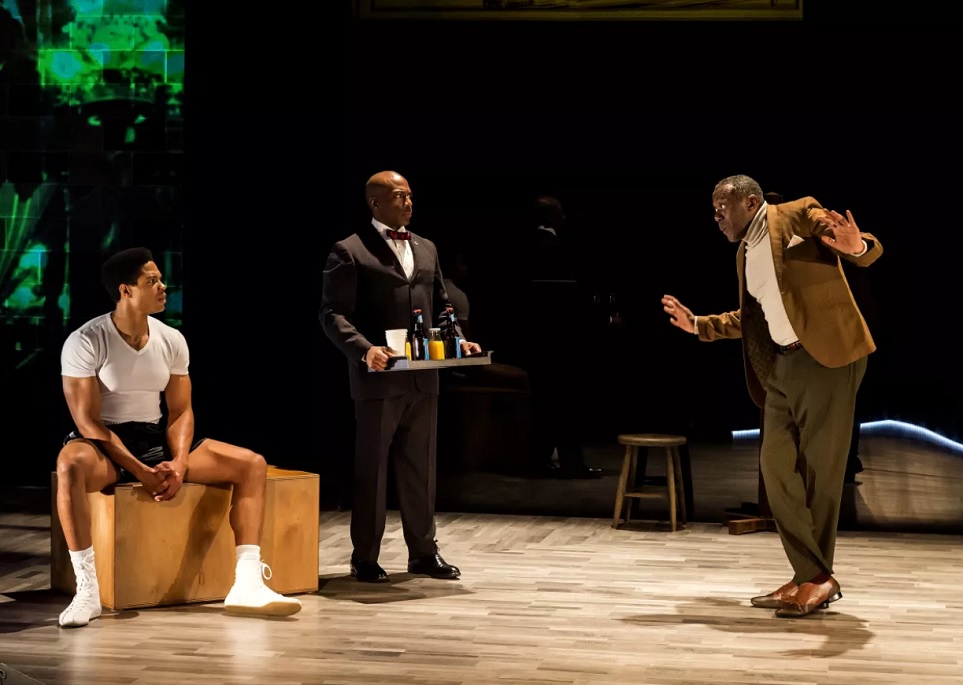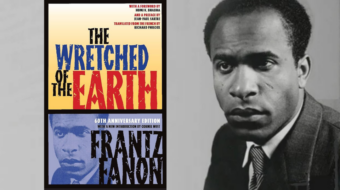
CULVER CITY, Calif. — The Extreme Court may have struck down affirmative action, but nevertheless, 2023 is shaping up to be a superlative year for debuts and revivals of Black-themed dramas treading the boards of Los Angeles stages. This bumper crop currently electrifying L.A.’s theater scene includes June Carryl’s police brutality two-hander Blue; Katori Hall’s Dr. King one-acter The Mountaintop; plus an adaptation of Shakespeare’s Macbeth starring African-American actor Max Lawrence in the title role in repertory this summer.
Now we can add to this already auspicious list Will Power’s thought-provoking, perplexing Fetch Clay, Make Man, directed by Debbie Allen. As the newly minted Muhammad Ali (Ray Fisher, reprising the role he first played a decade ago) prepares for his 1965 rematch with ex-champ Sonny Liston, the heavyweight champion summons Stepin Fetchit (Edwin Lee Gibson) to his training camp in Maine. The premise is fascinating, if not flabbergasting.
Why would the glib, poetic pugilist who boasted, “I’m so fast that…I turned off the light switch…and was in bed before the room was dark,” want to meet the actor/comedian famous for his “dim-witted, tongue-tied stammer” and “phenomenal slow-lazyman shuffle,” as film historian Donald Bogle wrote in 1973’s Toms, Coons, Mulattoes, Mammies, & Bucks? If Ali was the Sixties exemplar of Black Pride, what motivated him to seek out what Bogle dubbed “the embodiment of the nitwit colored man” and “plantation darkie” of Thirties movies, such as John Ford’s Judge Priest? What would the embodiment of the emerging Black Power movement need from the servile “coon” whose anachronistic, embarrassing screen stereotypes and buffoonery made him the epitome of “race traitors” and “Uncle Toms” (epithets hurled onstage)?
This is the central plot point and mystery of Fetch Clay, Make Man. The first question I had during intermission was, Did the playwright conjure this seemingly preposterous tête-à-tête up out of thin air and his feverish imagination? According to Bogle, Stepin Fetchit “turned up in the entourage of Muhammad Ali”; and an article in the two actor’s playbill refers to “the unlikely friendship” between them. Otherwise, this piece sheds no light on what Muhammad’s motivation was for arranging the has-been movie star’s trip up to Maine.

Is Will Power doing what Kemp Powers did in his 2013 Cassius Clay/Ali play One Night in Miami, that is, rendering a work of speculative theater, reading into, expanding, and dramatizing an actual historical occurrence? Kemp’s title refers to the night the then Cassius Clay defeated Liston to take the heavyweight title, then returned to his Miami hotel room with Malcolm X, singer Sam Cooke, and athlete Jim Brown. That much is known about February 25, 1964—the rest, Powers apparently spun out of whole cloth—and his creativity, imaginatively going behind closed doors to manufacture a stellar play.
Be that as it may, Fetch Clay, Make Man has several subplots. Alexis Floyd portrays Sonji, Ali’s first wife. He has conflicts with her as she declines to play her assigned role as an obedient, dutiful, modest Muslim wife by insisting on being the contemporary, worldly woman which is truer to her real self. Wilkie Ferguson III plays Brother Rashid, Ali’s Man Friday, the head of his security and the boxer’s Nation of Islam minder. Flashback scenes set during the late Twenties/ early Thirties show that offscreen Stepin Fetchit was a crafty, shrewd negotiator, who outfoxed movie mogul William Fox (Bruce Nozick). All of the contemporary characters want to get something from and out of the world-famous, rich champ, who was only 23 years old in 1965.
Getting back to the play’s central premise, perhaps this is why the beleaguered Ali brings the washed-up movie star all the way to Maine. After all, Stepin Fetchit was arguably as famous during his Hollywood heyday as Ali is in 1965; both are among the best known Black men of their times. Ali may be seeking counsel from the onetime Tinseltown celebrity as to how best to handle his new-found fame, fortune, and notoriety.
Another possible reason suggested by the play is that since Stepin Fetchit knew the first Black heavyweight champion, Jack Johnson, he may be able to impart to Ali a boxing secret that will empower Ali to again defeat Liston in their upcoming bout. Indeed, at a press conference, Ali refers to the former comedian as his “secret strategist.”
I still sense that there’s more to the Ali-Fetchit relationship than the above explanations, although they probably played a role in the athlete’s soliciting of the actor. I’ve been pondering this puzzling conundrum since the proverbial curtain rose at the Kirk Douglas Theatre, and I’m not the only one. In 2013, when Fetch opened at Off-Broadway’s New York Theater Workshop in a production also starring Ray Fisher, Charles Isherwood wrote in The New York Times: “The dramatic adrenaline necessary to create a powerful play does not entirely materialize. Mr. Power tosses interesting ideas and contrasting characters into the ring, but doesn’t quite succeed in shaping a compelling narrative.” (Power’s play premiered in 2010 at the McCarter Theater in Princeton, N.J., with Ben Vereen depicting Stepin Fetchit.)
What I suspect Will Power is getting at is that descendants shouldn’t dismiss and disregard their forebears and that each generation can learn from and has something to offer one another. Stepin Fetchit may have played demeaning roles, but he lived in a more racially restrictive time, when apartheid was still widely practiced in America, whereas the Black nationalist Clay/Ali emerged as the Civil Rights movement was challenging segregation.
Bogle points out: “At a time when contracts for black players were unheard of Fetchit was signed” by Fox. He was also the first to become a millionaire and among the first African Americans to receive billing for the movies they acted in. In the character’s own defense in Fetch, he argues: “I snuck in the back door, so you could walk in the front.” Power’s play seems to make the point that today’s generation stands on the shoulders of yesterday’s forebears.
Furthermore, beneath the celluloid stereotypes, Stepin Fetchit’s shuffling persona was a clever, elaborate ruse that enabled him to avoid doing lots of hard work. It’s not as if the cotton plantations of the antebellum and Jim Crow South had profit-sharing plans and benefits for their laborers.

Two-time Tony nominee and Golden Globe/Drama Desk Award winner actress/choreographer Debbie Allen of Fame fame nimbly helms her cast, eliciting sensitive, nuanced performances from all five members of the cast. Allen’s renowned background as a choreographer comes in handy when directing Ray Fisher as the boxer known for his fancy footwork, floating like a butterfly, stinging like a bee. Projection designer Pablo N. Molina’s enlarged images of the actual actor and athlete (not of the actors depicting them) showing on the upper walls of the Kirk Douglas enhance the production. Scenic designer Sibyl Wickersheimer’s set is mostly bare, although behind what may be the upper walls’ scrims hanging heavy punching bags can be glimpsed. At one point the athletic Fisher deftly demonstrates his fisticuffs finesse, punching a speed bag downstage.
The play also explores Ali’s conflicted feelings regarding Malcolm X and the allegation (planted by the FBI?) that the late leader’s followers are (literally) gunning for him. In 2021, when I interviewed Ken Burns about his Ali mini-series for PBS, television’s top documentarian told me: “I think it’s also fair to understand that this 21-, 22-year-old kid is terrified that the same thing might happen to him if he got on the wrong side of Elijah Muhammad… I mean, Malcolm X was assassinated by members of the Nation of Islam… the Fruit of Islam—the NOI’s enforcers [which Fetch’s Rashid is a member of]—have got to be scaring the bejesus out of everybody, including—after the assassination of Malcolm X—a very young and impressionable Cassius Clay….”
As mentioned above, Ali’s marital woes are also touched upon in Fetch. Interestingly, the play’s one sex scene ends with coitus interruptus, which may be a reference to sexual conflicts Ali possibly had. Ali’s acting career is also alluded to; Stepin Fetchit yearns to make a comeback on the silver screen with a biopic about Ali called The Greatest. Although unmentioned onstage, Ali actually did play himself in a biographical movie of that name in 1977, co-starring Ernest Borgnine as Ali’s cornerman Angelo Dundee, Robert Duvall, and John Marley. Who knows, maybe this movie originated as Stepin Fetchit’s idea? (Ali also starred in the 1979 TV movie Freedom Road as a Reconstruction Era legislator who stands up against white supremacists. The novel was written by blacklisted ex-Communist Party member Howard Fast and helmed by Czech director Ján Kadár.)
Upon leaving the theater, an African-American usher insisted on telling me what the drama’s title, Fetch Clay, Make Man, meant. She noted that “Fetch” and “Clay” not only refer to the two lead characters but also means to get clay in order to sculpt a man, by combining the older with the younger generation. I guess it’s as good an interpretation as mine. I’m not sure that I fully understood Will Power’s intent, and I’m still thinking about it. Perhaps that’s one of the highest compliments one could pay any work of art.
Fetch Clay, Make Man is highly recommended for serious theatergoers who love: Great acting, stories about racism, Muhammad Ali, film history, boxing, a thrilling night out at the “thee-a-tuh,” and searching for what lies beneath the surface to discover the substance, to go from appearance to essence. My prediction is that this play will be adapted for the screen as One Night in Miami was, and the movie version will also be directed by an African-American woman—Debbie Allen, but of course. (You heard it here first!) In any case, don’t miss this compelling drama about the strange but true relationship between the lightning-fast, poetic Louisville Lip and the so-called “Laziest Man in the World” who, as Bogle wrote, “could never pronounce a word with more than one syllable.”
Fetch Clay, Make Man is being performed through July 16 at the Kirk Douglas Theatre, 9820 Washington Blvd., Culver City 90232. Tickets and info can be obtained here, and at (213) 628-2772.
Aloha oe (farewell to thee), Julian Sands.
We hope you appreciated this article. At People’s World, we believe news and information should be free and accessible to all, but we need your help. Our journalism is free of corporate influence and paywalls because we are totally reader-supported. Only you, our readers and supporters, make this possible. If you enjoy reading People’s World and the stories we bring you, please support our work by donating or becoming a monthly sustainer today. Thank you!










